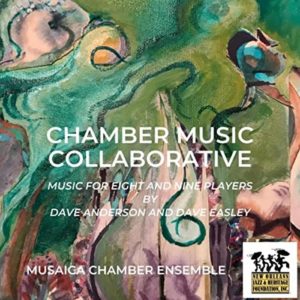The Musaica Chamber Ensemble is a non-profit group of eight musicians from the Louisiana Philharmonic. One of the founding members is double bassist Dave Anderson, who has been featured in OffBeat several times. The ensemble’s repertoire is rather adventurous, including new works as well as favorites like Copland’s Appalachian Spring and Schubert’s Octet.
On this new CD, Dave Anderson is joined by pedal steel guitarist, Dave Easley. In fact, the opening piece “Octet for Bass Clarinet, Violin, Viola, Cello, Pedal Steel Guitar, Double Bass, Harp and Percussion” was composed jointly by Anderson and Easley.
It’s not surprising to find Easley as a composer with Anderson, as they have worked together with the Anderson/Easley Project, and with others including the Radiators, the funky Meters and Walter “Wolfman” Washington.
The octet is in four movements, opening with an allegro that hints of jazz, particularly when the pedal steel guitar enters.
The somber third movement with the pedal steel guitar and double bass working together brilliantly, ends in an unexpected serenade that features the bass clarinet prominently.
The last movement, “Allegro,” is by far the most traditional classical movement but it veers into an Indian sitar-sounding middle section. It’s the pedal steel that gives it that vibe. The double bass with its walking bass line, along with the pedal steel guitar with all eight instruments, brings the “Octet” to an exciting conclusion.
The next selection, by Dave Anderson, “Nonet for Flute, Oboe, Clarinet, 2 Violins, Viola, Cello, Double Bass & Harp” also in four movements, features flute, oboe and clarinet along with strings. The opening movement, “Allegro,” is reminiscent of Shostakovich, although it certainly has its own voice. The second movement, “Funk,” contains woodwind staccato sections, punctuated by the strings. Don’t expect it to sound like the funky Meters, but the movement is especially thrilling.
The third movement titled “Elegy – In memory of all Covid victims” is—as expected —gloomy. It’s subdued and lugubrious pacing does contain an especially wonderful section where the harp, played by Anderson’s wife (Catherine) plucks out a melody picked up by the woodwinds. The strings, once again are reminiscent of Shostakovich, and add to the melancholy tone, but the solemnity is brightened a bit by the swirling woodwinds.
The “Nonet” ends with a “rondo” opening with the flute and strings. The pattern is a bit complex with a repeating melody played by the flute with a harp glissando punctuating the piece. The strings bring the “Nonet” to an exhilarating conclusion.
This CD clearly demonstrates Anderson’s skill as a composer. Anderson said in an OffBeat interview: “I don’t want any division between jazz or classical or rock musicians. And I feel New Orleans is one of the few towns where that approach could really work out well.”




